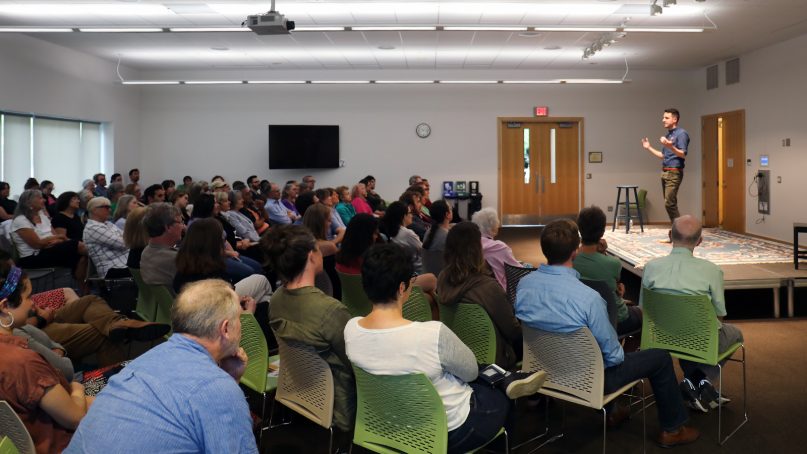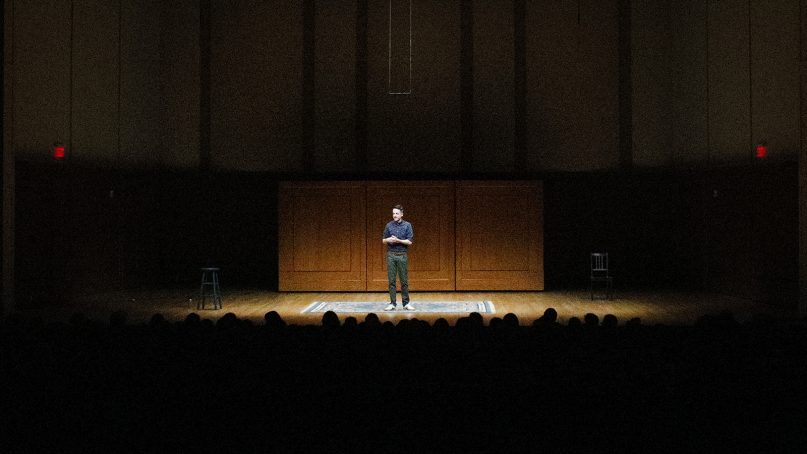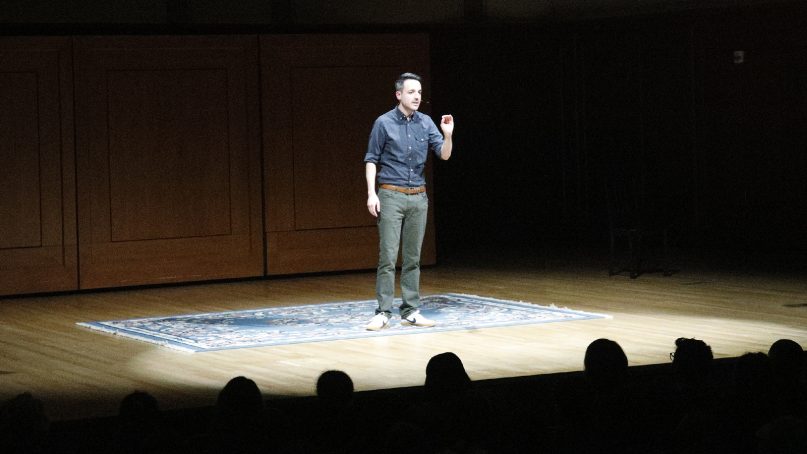CHAPEL HILL, N.C. (RNS) — As the set-up for a one-man comedy show, Andrew Aghapour’s opening line doesn’t seem to be built for laughs: “I am a scholar of religion.”
But the audience of 75 mostly young people at a public library in this college town, with a few professors sprinkled in for good measure, is riveted by the 90 minutes that follow. The 33-year-old standup comedian, who indeed has a Ph.D. in religious studies from nearby University of North Carolina, tells a story of growing up in the South as the son of a Muslim father from Iran and a Protestant Christian mother from England, who was left to wrestle with this inheritance among his Bible-belt neighbors.
The experience rendered him anxious, confused — and no longer Muslim.
Aghapour’s show, “Zara,” echoes the themes of a growing group of stand-up comedians who have disengaged from the orthodox traditions of their Muslim faith — celebrity comics Aziz Ansari, Kumail Nanjiani and Hasan Minhaj.
Standing upright on a stage sparsely decorated with a Persian rug and a stool, he tells how he evolved from a Muslim who prays five times a day and fasts on Ramadan into a bacon-eating, marijuana-smoking nihilist, who ultimately found his way to agnosticism.
Like the other comics, his Muslim upbringing still resonates as a marker of identity — even if it’s not a marker of belief.
Aghapour concedes that identifying as an agnostic sounds boring: “On the dinner menu of religious beliefs, agnosticism is like the baked tilapia, right? No one’s excited to order it. It’s just there in case you’re allergic to everything else.”

Comedian Andrew Aghapour, right, performs a stand-up routine on May 1, 2019. Photo by Ashley Melzer, courtesy of Andrew Aghapour
But unlike his colleagues, Aghapour is still fascinated by his own evolution and religion more broadly. His show features crowd-pleasing bits about his crisis of faith after first tasting bacon (“Why would a just and loving God not want me to eat that?”), his first love (“So I met marijuana the first weekend of college, at a bonfire. I later learned that marijuana loves to hang out at bonfires”).
But he also introduces audiences to the ancient Persian prophet Zarathustra, the German philosopher Friedrich Nietzsche and theories about the rise of secularism and the notion of the sacred and profane.
“This generation that’s coming up is actively negotiating their religious identity, and I really hope the show is a resource for doing that,” he said a few days after the performance while sipping a cortado at a coffeehouse near his Durham, N.C. home.
Comedy, he said, may be the perfect way to help them along and is the reason he starts his show by pointing out his academic cred.
“A scholar of religion lets the audience feel a little bit at ease. I can talk about religion in ways that may be confusing and perplexing at first, but I have the bona fides to walk them through some of these ideas and walk them into a new place.”
He riffs on Zarathustra sitting by the river watching the water flow when the idea of monotheism comes to him: “Keep in mind, this is 1,500 B.C.E., before the Internet, before books. This is pre-content, right? So rivers were like the most binge-worthy thing you could possibly want.”
Aghapour, who is married and has a 1-year-old daughter, said he discovered stand-up comedy and improv almost by accident. The firstborn of immigrants who ran a restaurant, he was pushed to study hard and train in a profession that would gain him a solid middle-class footing.
After graduating from the College of Charleston, he went on to Cambridge for a master’s degree before earning his doctorate from UNC-Chapel Hill.
He was 26 and a student in Chapel Hill when he first walked into a comedy club.
“Once the show started,” he said, “I instantly knew I could do it.”

Comedian Andrew Aghapour performs at the University of North Carolina on April 2, 2019, in Chapel Hill. Photo by Ashley Melzer, courtesy of Andrew Aghapour
He took a class in improvisation; two years later he was teaching the class.
Comedy, he said, was not entirely new to him. Growing up he had watched a lot of comedy alongside his parents and had intuitively learned what kinds of things would make his mom or dad laugh.
By the time it came to write his dissertation, he was making more money on comedy than he was teaching religion on a graduate student stipend. Plus, he realized, the life of a college professor would pretty much mean giving up on comedy, since the demands of a tenure-track academic post would leave little time for his funnyman passion.
Just why so many young Muslim-Americans have taken to comedy may have something to do with our cultural moment, said Samah Choudhury, a graduate student in religious studies at UNC Chapel Hill.
Back in 2005, a Danish newspaper published cartoons of the Prophet Muhammad that set off a wave of violent protests by Muslims who found the cartoons highly offensive.
‘The dominant narrative about the protests was that Muslims don’t have a sense of humor; they can’t take a joke. A sense of humor is entirely alien to these people,” Choudhury said.
In the aftermath, stand-up gave young Muslims a platform and way to showcase their humanity.
Unlike the wildly successful comedic superstars, Aghapour doesn’t make his living entirely on stand-up; he edits and writes for journals on the side. But he’s committed to remaining local instead of heading to New York, finding an agent and eking out a living on the comedy club circuit.
In the meantime, he’s planning to take his one-man show on tour to college campuses. He and his producers are in talks with five universities for spring 2020 dates. They’re also thinking of a podcast audio format for the show.
Meanwhile, he and his wife Emmie, an ex-evangelical Christian, are exploring parenthood. They haven’t quite figured out how to rear their daughter in religious tradition.
Aghapour sees faith in a capacious way. If there’s one message he wants to tell his audience, it’s that human beings need not reject religion or affirm it absolutely but can seek out their own values. Aghapour proudly points out that on his daughter’s bedside table are two books: a children’s volume of Bible stories that his wife’s mother bought her and another book he hunted down, called “Nietzsche in Shapes and Colors.”
The monologue that ends his show is about his daughter’s birth and the wonder of seeing the world anew. He ruminates on when to introduce his daughter to bacon. But he also takes a serious turn, suggesting that the one thing that gave him so much anxiety growing up — faith — can also be a portal to a different way of engaging life.
“Imagine,” he said, “seeing it all in front of you and saying yes to all that chaos.”





